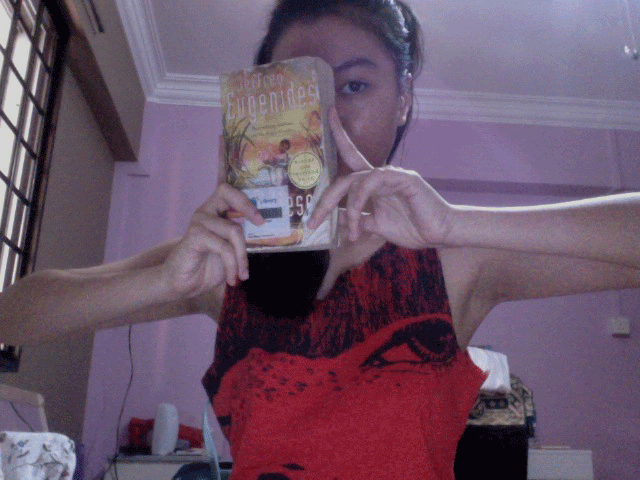
the most battered book i have tried reading. in the middle of my reading, the back cover detached itself, which my mother saw and offered to fix. it was a library book.
Emotions, in my experience, aren't covered by single words. I don't believe in "sadness," "joy," or "regret." Maybe the best proof that the language is patriarchal is that it oversimplifies feeling. I'd like to have at my disposal complicated hybrid emotions, Germanic train-car constructions like, say, "the happiness that attends disaster." Or: "the disappointment of sleeping with one's fantasy." I'd like to show how "intimations of mortality brought on by aging family members" connects with "the hatred of mirrors that begins in middle age." I'd like to have a word for "the sadness inspired by failing restaurants" as well as for "the excitement of getting a room with a minibar." I've never had the right words to describe my life, and now that I've entered my story, I need them more than ever.
the book feels like a diary in a sense that, i feel like i know how i'd have felt had i been in calliope's shoes. (it is, in fact, written in a form that resembles a diary, only backwards/a recount) i wouldn't exactly know, perhaps, for it is impossible to fully understand someone unless you are wrapped under his skin and veins, but i would know with an almost perfect precision because even the vaguest detail like how some figure slips out of the narrative secures its portion in the end. (it indicates that along calliope's life, some people have stopped crossing paths with her, which always happens in real life situations too: not everyone stays.) the book is personal and honest, and like eugenides' previous novel the virgin suicides, it encompasses all major and minor events happening throughout the life of the character(s). what is even more interesting in middlesex is that the story comes across three generations, that your entity sometimes has to be traced back to its very root where it all first came from. i am not close to my grandmother and grandfather, even when they were still alive, at all, and i was not supposed to be able to imagine bathing a pair of feet of an elderly with warm water in a room that often lacks sunlight. however, the image provoked in the book was so vivid i could imagine myself feeling over my grandma's wrinkled toes and pale veins, the wash of the salt water, the colour blue and the container that holds it altogether.
"There have been hermaphrodites around forever, Cal. Forever. Plato said that the original human being was a hermaphrodite. Did you know that? The original person was two halves, one male, one female. Then these got separated. That's why everybody's always searching for their other half. Except for us. We've got both halves already."
middlesex is an elaborate account of life and transitions. calliope suffers from the 5-alpha-reductase deficiency; a mutation of 5-alpha-reductase, an enzyme that converts testosterone to dihydrotestosterone, causing her to be born with ambiguous genitalia. like most 'abnormals', calliope experiences denial, depression, regression and acceptance when dealing with her uncommon features. from puberty to love stories, each told from an amusing, different perspective. it is not only about irregularities, the book is also a window to the pre-millenium America and the crises that drains the country for a few times. they are viewed from both macroscopic and microscopic levels; the latter for example, to watch the adults' business rolling down the dimness, to watch teenagers with slight excess of wits doing stupid things other teenagers do, to witness rich kids running away from their fathers and mothers' embracing hands to the dirty corners of an unwelcoming suburb. and all these are only a slice of the whole narrative. the true narrative spans all stages of life, perhaps with the infancy stage being the less prominent, but that should be understood because we have infant amnesia anyway, so that does not subtract the charm of the book by a little. if the virgin suicides feels more attractive in a doleful and delicate way, middlesex feels more open and true, although it is still adorned with some perky fairytales. (for example, the dainty relationship between lefty and desdemona back in the greek village in turkey, which i really liked.)
I was thinking how amazing it was that the world contained so many lives. Out in these streets people were embroiled in a thousand different matters, money problems, love problems, school problems. People were falling in love, getting married, going to drug rehab, learning how to ice-skate, getting bifocals, studying for exams, trying on clothes, getting their hair-cut and getting born. And in some houses people were getting old and sick and were dying, leaving others to grieve. It was happening all the time, unnoticed, and it was the thing that really mattered.
such a beautiful book.

No comments:
Post a Comment